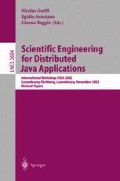Abstract
Within the Model Driven Architecture (MDA) models and model transformations play a central role. At the model level OCL adds the precision that is lacking in plain UML. A model that combines the use of OCL and UML is perfectly suitable for MDA transformations. At the meta-model level, OCL is used to define validation rules for models. These can be executed against a model to automatically check whether the model conforms to the validation rules. The third use of OCL is as part of the transformation language in which MDA model transformations will be defined. The OMG has issues an RfP for such a language.
Access this chapter
Tax calculation will be finalised at checkout
Purchases are for personal use only
Author information
Authors and Affiliations
Editor information
Editors and Affiliations
Rights and permissions
Copyright information
© 2003 Springer-Verlag Berlin Heidelberg
About this paper
Cite this paper
Warmer, J. (2003). The Role of OCL in the Model Driven Architecture. In: Guelfi, N., Astesiano, E., Reggio, G. (eds) Scientific Engineering for Distributed Java Applications. FIDJI 2002. Lecture Notes in Computer Science, vol 2604. Springer, Berlin, Heidelberg. https://doi.org/10.1007/3-540-36520-6_18
Download citation
DOI: https://doi.org/10.1007/3-540-36520-6_18
Published:
Publisher Name: Springer, Berlin, Heidelberg
Print ISBN: 978-3-540-00679-4
Online ISBN: 978-3-540-36520-4
eBook Packages: Springer Book Archive

